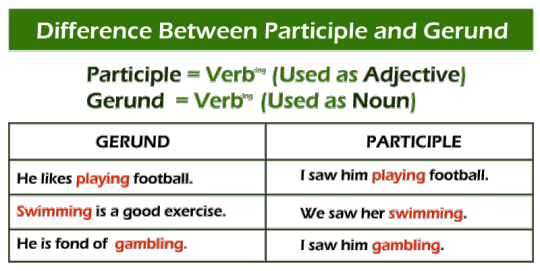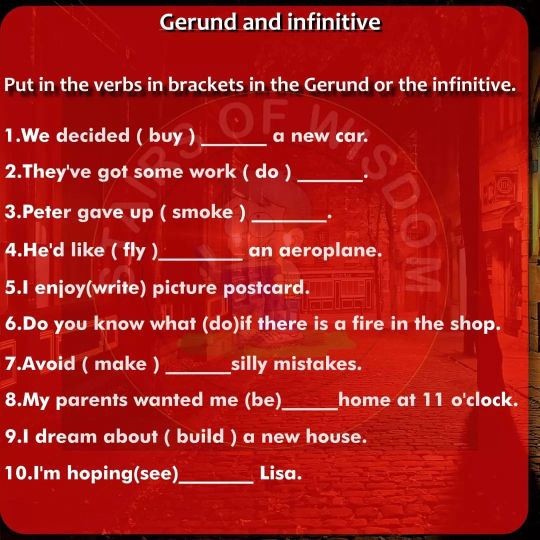#gerund
Note
Hey there! I’m using duolingo, and it has started giving me phrases to translate like “are you talking with Renato today?” But it hasn’t told me how to decide if I should use habla/Hablas, or hablando. So far, I’ve gotten alost all of them wrong, using one or the other, just guessing each time.
So my question is when should you use “verbs ending in ing, in spanish?
The gerund/progressive forms [the -ing forms] in Spanish show up with -ando, -iendo, sometimes -yendo (depending on the verb)
There are two minor things first:
The present tense would be fine for expressing this. Present tense is used for regular declarative statements that read more like talking about someone's general habits or more static/non-continuous actions hablas ["you speak"], as well as present continuous hablas ["you are speaking"]
The gerund forms [the -ando, -iendo, -yendo] can show up by themselves in some cases, but they often show up with estar or a verb of motion/continuation like ir, andar, seguir, continuar etc.
I'd also mention that whether you use habla or hablas depends on if you're using formal or informal "you", so habla could be usted "talks / is talking" depending how formal you're being
-
Basically though:
¿Hablas con Renato? = Are you talking to Renato? [continuous] / Do you talk to Renato? [plain present tense]
¿Estás hablando con Renato? = Are you talking to Renato? [progressive; implied "at this moment" or "continuously"]
Present tense by itself can be used for progressive/continuous
And generally you're not going to see gerund by itself unless it's part of a narrative structure [like: es la anfitriona perfecta, hablando con todos los invitados "she's the perfect hostess, speaking with all the guests", or something like that]
I doubt Duo would spring hablando on you without wanting you to use estar or something:
estás hablando con la gente = you're talking to people
andas hablando con la gente = you go around talking to people
sigues hablando con la gente = you keep talking to people
That's the general way you use gerund forms... and you can use them in any tense as long as the verb is conjugated; estaba hablando "he/she was talking", or estaré hablando "I will be talking" [future tense], estarían hablando "they might/could be talking" [conditional tense]
You can even see them in multiple verb constructs: voy a estar hablando con Renato luego "I will be talking to Renato later"
I hope this helps clear up some of the confusion, but let me know if there's still something you're unsure of. Or you can post the Duolingo prompts/questions and I'll explain what I would pick
28 notes
·
View notes
Text

2 notes
·
View notes
Text
i am a native english speaker. i have spoke english virtually all of my life. i just looked up "lie gerund" because i wanted to double check if it was "lying" (it is)
2 notes
·
View notes
Text
Pronoun this and pronoun that; gerunds are the most trans part of speech. You were assigned verb at birth and you identify as a noun? I respect that.
4 notes
·
View notes
Text

I was studying the differences between particles and gerunds last night (for my Na'vi studies lol) and got a little stuck.
But i found it helpful to change a verb from a gerund or participle back into its infinitive form to distinguish its role in the sentence and differentiate the two from each other since they can look identical in spelling in English but have very different functions (a gerund having more limited function). This also helps me more explicitly see tense in participles and see the "agent" nature of a gerund. My thought process went a little like this:
"I like jogging." -> example of a gerund
It wouldnt make sense to say "I like jog" because the verb is in the infinitive and English doesnt use infinitives as agents like this. So I see how the "-ing" suffix is a gerund forming morpheme to make a noun out of the verb by changing the syntatic function of the verb. The infinitive verb is now a noun that describes the "ability" to do that verb or the general essence of that verb. Ability and essence are nouns. This is specifically a gerund and not a participle because the "-ing" suffix on the verb "jog" is not used to change the verb into an adverb to describe a verb nor an adjective to describe a noun, nor is it nominalizing a clause; its standing on its own as the agent of the predicate, transitive verb "like".
"The jogging athlete passes the baton." <- example of a participle
Here the verb "jog" is used as an adjective to describe the subject noun "athlete". It wouldnt make sense to use the infinitive of the verb to describe the noun because the infinitive form doesnt function as an attributing adjectve this way in English. The morpheme "-ing" is added to the verb to turn it into an adjective that syntatically functions to describe the ergative noun.
This is specifically a participle and not a gerund because a participle forming morpheme is used to syntatically change the verb's function to an adjective that describes the ergative noun and participles have this verb changing ability. Participles can also syntatically change verbs into nouns and adverbs. Gerunds exclusively function to turn verbs into agent nouns, and the verb in this sentence isnt functioning as an agent noun of the predicate verb "passes".
---
I hope this is an accurate thought process to understanding these terms lol.
5 notes
·
View notes
Photo

Gerund and Infinitive One of the best platforms to crack IELTS is @skillssenglish <--------- 🙏 #Gerund #Infinitive #englishonline #Vocabulary #vocabularywords #Vocabulary #englush_learning #englishonline #englishtips #englishvocabulary #englishteacher #englishlanguage #englishgrammar #Englighprepration #ssc #banking #upsc #lessonoenglish #englishlesson #ieltstips #ieltsexam #ielts_speaking #ieltspreparation #adverbclause #nounclause #conjunction #relativepronouns #adjectiveclause #nounclause #adverbclauses #Superfluous (at Dehradun The City Of Love) https://www.instagram.com/p/ChsC2kmpv3_/?igshid=NGJjMDIxMWI=
#gerund#infinitive#englishonline#vocabulary#vocabularywords#englush_learning#englishtips#englishvocabulary#englishteacher#englishlanguage#englishgrammar#englighprepration#ssc#banking#upsc#lessonoenglish#englishlesson#ieltstips#ieltsexam#ielts_speaking#ieltspreparation#adverbclause#nounclause#conjunction#relativepronouns#adjectiveclause#adverbclauses#superfluous
9 notes
·
View notes
Text
GERUNDS
Watch these videos and pay attention to the explanation and examples.
youtube
Gerunds in five steps (7:24)
youtube
GERUNDS and INFINITIVES (19:13)
VERBS + GERUND
Admit – anticipate – avoid – can’t help – consider – deny – feel like – involve – mention – practice – recommend – risk – suggest
VERBS + INFINITIVE
Agree – ask – decide – deserve – expect – hope – learn – manage – need – threaten – wait – want – volunteer – offer – plan – promise – refuse – seem – struggle
VERBS + OBJECT = INFINITIVE
Ask – expect – require – hire – invite – order – remind – teach – tell – urge – warn
VERBS + GERUND + INFINITIVE (no change in meaning)
Like – love – hate – prefer – begin – can’t bear – can’t stand – continue – propose – start
VERBS + GERUND + or INFINITIVE (a big change in meaning)
Remember – forget – try – stop - regret
Watch these videos and pay attention to the explanation and examples.
youtube
Gerunds in five steps (7:24)
youtube
GERUNDS and INFINITIVES (19:13)
0 notes
Text
THE IMPERATIVE MOOD AND NON-FINITE FORMS OF "TO HAVE"

The Imperative form of the verb "to have"
Affirmative
Negative
Have!
Don't have!
The Infinitive form of the verb "to have"
in the Indefinite, Continuous, and Perfect aspects:
Aspect
Infinitive
Indefinite
to have
Continuous
to be having
Perfect
to have had
The Gerund form of the verb "to have"
in the Indefinite and Perfect aspects:
Aspect
Gerund
Indefinite
having
Perfect
having had
The Participle form of the verb "to have"
in the Present, Past, and Perfect aspects:
Aspect
Participle
Present
having
Past
had
Perfect
having had
THE IMPERATIVE MOOD AND NON-FINITE FORMS OF TO HAVE
Conjugation of To Have in Perfect Tense
Conjugation of To Have in Continuous Tense
Conjugation of To Be in Perfect Tense
Conjugation of To Be in Indefinite Tense
Conjugation of to smile in Perfect Continuous Tense Form/Active
Word Formation: Word derivation; Word Building in English
Noun-Modifying (Adjective) Clauses
Adverb, conjunction, and preposition examples
Read the full article
#continuous#forms#gerund#imperative#indefinite#infinitive#mood#non-finite#participle#past#perfect#present#tohave
0 notes
Text
The Gerund
A gerund is a verb form that ends in “-ing” and functions as a noun in a sentence. It’s an essential aspect of English grammar, allowing verbs to play the role of subjects, objects, or complement to other words in sentences. Here are some key points about gerunds with examples to help illustrate their use:
1. As a Subject of a Sentence
Gerunds can act as the subject of a sentence, where they…
View On WordPress
0 notes
Text

jan 2022
riceboy
#encountersltdart#rice boy#gerund#classic webcomic from 06ish#yep#06ish is classic now#it's a fun time#i don't recommend it to kiddos though because of that one scene#if you have read it you know what i mean#anyway what was i talking about#oh yeah#i love these two#true companions#fanart 4 others
1 note
·
View note
Text
“What Is Gerund? Special Verbs That Are Also Nouns” # Difference between Gerund and participle
Quick Grammar Rules
1 note
·
View note
Text

It's better to joke around than be salty.
4 notes
·
View notes
Photo

#portaldoaprendizdoingles #Repost @bbclearningenglish with @let.repost • • • • • • 🤔Do you know how ‘forget’ changes its meaning with ‘to’ + verb and verb-ing? Phil has a quick tip to make sure you never forget the difference! Now try this quick #quiz: Oh no! I forgot ______ my mum yesterday - it was her birthday, so she'll be annoyed! A) to call B) calling EXTRA: Want to improve your English vocabulary and listening in just six minutes? In this audio programme, we'll discuss why we forget the things we've learned. Link in bio. #learnenglish #englishtips #ELT #ielts #forget #grammar #confusingwords #vocab #wordforms #gerund #infinitive https://www.instagram.com/p/CnUe7-Wrzgr/?igshid=NGJjMDIxMWI=
#portaldoaprendizdoingles#repost#quiz#learnenglish#englishtips#elt#ielts#forget#grammar#confusingwords#vocab#wordforms#gerund#infinitive
0 notes
Link
Topics Covered:
👉 Gerund কি?
👉 What is the meaning of gerund?
👉 what is compound words gerund noun?
👉 Gerund noun compound words examples
#Englishtutorial#gerund#gerund_in_English#abstutorial#competitiveExam#Spoken_English#EnglishSolutions
0 notes
Text

was looking at the watcher store again and noticed this puppet university has a latin motto on it, "disce aut pereant". this means, of course, Learn Or Perish. my university latin classes Did prepare me for this day :)
#mod post#puppet history#wearewatcher#Class let me teach you how to diagram sentences. let me teach you the subjunctive. let me teach you Gerunds#anyway ive noticed a lot of puppet history stuff is on sale and i saw that theyre discontinuing items as well#i wonder what that means. im stressed watcher is in the red and thats why they're doing this#but maybe theyre just going to add new inventory soon?? lets hope it's that
233 notes
·
View notes
Text

was clearing out my phone's gallery and once again realized how much art i never posted here, so here's a stijn strongbody!
[ID: a digital line drawing of Stijn Strongbody, a middle aged Japanese man with four sheep's horns, and, barely visible before the canvas cuts off, four arms. he holds a pencil in one hand as he looks off to one side with a good-natured, contemplative expression.]
#q#blaseball#tokyo lift#never was a stijn fan per se but i always thought he was kinda fascinating. he definitely had Plans for the lift#the extent of which only started to be uncovered by his successors after his death.#it left yusef wondering how much he had actually predicted and planned for. how much the lift was continuing along a track he had set.#what were his plans? the only person who knew (original elwin) got alted and stijn never trusted the plans to another person afterwards#it's likely whatever plans he set failed anyways without having anyone to keep course after he died. but there's always that doubt.#did stijn know this would happen. did he predict the things that would happen. did he predict gerund's death#idk idk his death was just so neat because it left all these questions that could never be answered.#also he was Science Gay with a interdimensional fungus inhabiting a large dead bug until it used their joint research#to hop dimensions again without saying goodbye and pulled some unwilling alternate version of itself to take its place#so there's also that lol#my blaseball art#buzzart#anyways yeah might be posting some more old art
22 notes
·
View notes